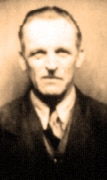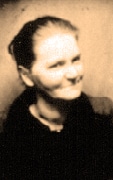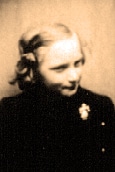The Danner Family

The Danner family lived at No. 3, Rue des Seigneur in Lower Yutz, Moselle, France. The father, Jacques Danner (nicknamed Jacob) was born on March 22, 1898 in Rohrbach and worked as a laborer at the blast furnaces. He married Augustine Rosine Hantz, born on February 25, 1899. The first addition to the family was a daughter, Helen, born on January 19, 1922. Nearly twelve years later the youngest member of the family, Ruth, was born on December 9, 1933. Meanwhile, the Danners had become Jehovah’s Witnesses, known as Bible Students (or Bibelforscher in German-speaking countries). Jacques qualified as a carpenter and no longer had to work at night, which had prevented him from attending Bible meetings. He and his wife spent the better part of their time sharing Bible-based knowledge with their fellow citizens. They were ostracized by the local community for carrying out this activity in a fiercely Catholic region.
In 1941, the family faced an even harder ordeal with the German invasion of Alsace-Lorraine. At the time, Helen worked as a housemaid and Ruth attended school. Hitler decided that the region should become part of the Volksgemeinschaft (people’s community) and imposed the compulsory Nazi salute in the annexed region. Little Ruth, who already stood out because she would not participate in prayers at Catholic public school, stubbornly refused to say “Heil Hitler” at school in spite of being hit and bullied. Her attitude attracted the attention of the Gestapo who subjected her parents to long and repeated interrogations, even though Ruth was frequently found sitting on the threshold of the locked house waiting for her parents to return.

On January 28, 1943, the entire family boarded a bus to the Metz train station where a train was waiting to deport them to Poland. The Gestapo agents allowed the neighbors to steal the Danners’ possessions “because” they stated, “they won’t ever need them again.” After a three-day trip, Jacques, Augustine, Helen and Ruth arrived in Upper Silesia. Here they were successively imprisoned in the same labor camps: Kochlowitz, Schwientochlowitz, Wolfsdorf and Frankenstein. When Jacques was sent to the Gutendorf camp, his wife and daughters, having no news of him, feared they would never see him again. However, the separation was thankfully short.
Living conditions in these labor camps were extremely distressing due to overcrowding, vermin-infested barracks, and water barely trickling from the taps. The work was grueling, men toiled in the copper mines and women on construction sites. Children as young as three years old had to engage in forced labor. Health care was limited. When little Ruth developed an infection on the tip of her fingers, the “cure” was to pull out her affected nails without any anesthesia.
On February 19, 1945, due to the advancing Red army, all prisoners were evacuated and marched on foot towards the west. The Danner family, harassed, exhausted, and covered with vermin, was finally liberated on May 5, 1945 after a long and chaotic march of 152 miles that lasted several weeks. Upon their return to Lower Yutz, their former landlord arranged for them to return to their house that had been hit by a bombshell. Some of their neighbors even returned some of the possessions they had removed from the house.

In order to support his family, Jacques first got a job building bridges, and later worked as a locksmith. Grateful to have survived, both parents and Helen and Ruth dedicated themselves to their Christian evangelizing work in Lorraine. Later, Ruth also joined the CETJAD (European Circle of Former Jehovah’s Witnesses Deportees) of which she became the president. Jacques Danner died in 1978 at the age of 80, and his wife, Augustine, died ten years later at the age of 89.

